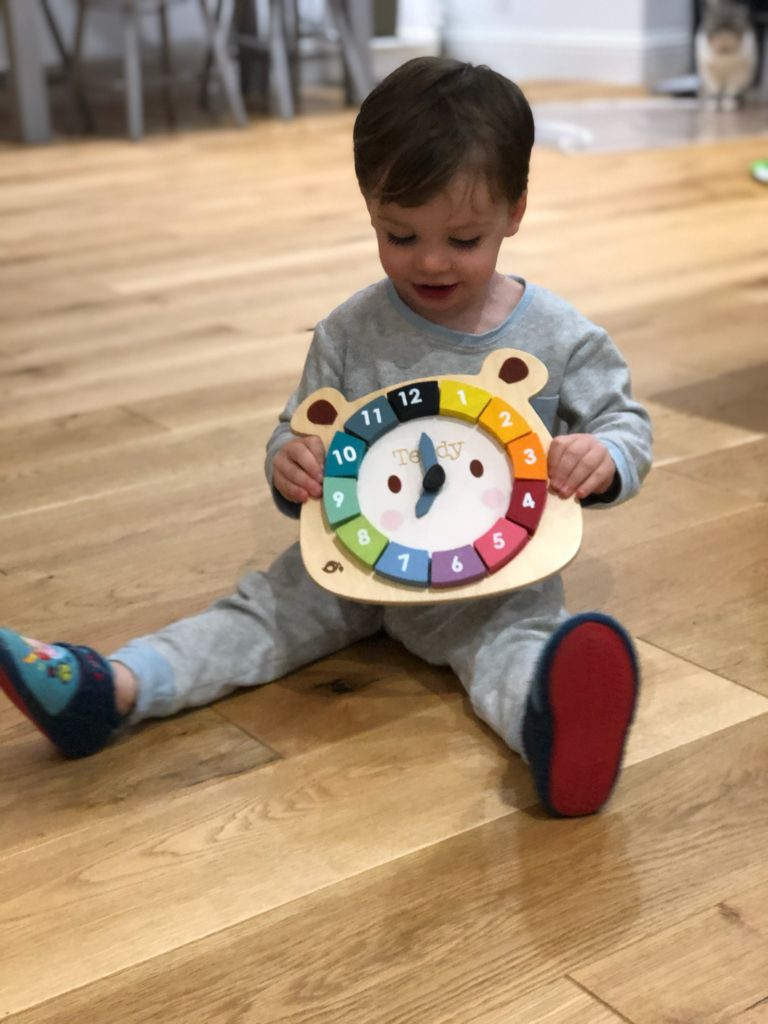So the clocks are going back by 1 hour in the UK and Ireland at 2am on Sunday 29th October 2023. Apart from knowing that Halloween is only a couple of days away day, Fireworks Night is a week later and Christmas is fast approaching, what does that mean for you?
Well it might have used to mean a longer lie in on your Sunday morning, or an extra hour on the dancefloor on your big Saturday night out (those were the days!).
However, if you are reading this blog that is highly unlikely to be the case now!
Instead, your main focus now is about how that one hour change in the clocks is going to have on your little one’s sleep routine.
So what can you do with your baby when clocks go back?
There is no doubt that this can be a difficult change. It’s a bit like going on holiday to Europe where there’s a 1 hour time difference.
We think it’s a bit easier mentally to prepare for that as: 1) you are going on holiday! and 2) You are travelling there which means you know that your daytime routine will go out of the window on travel days.
With the clock change, it might seem a little different than that holiday away, but the concept is similar. And for us, we promote two options to handle the change: one is a bit more gradual and in-keeping with their existing routine; the other is a bit more of a “do-it-in-one” approach.
Both do work, they just have a different path in getting there.
The Gradual Approach
Let’s look at the gradual approach first (based on a 7am-7pm routine):
- On the Wednesday before the clocks go back an hour, start to adjust your little one’s nap(s) and bedtime, putting them to bed 10-15mins later than usual. For example if they are doing 1 nap and it’s normally at 1pm, start pushing that to 1.15pm and then bedtime from 7 to 7.15pm, this is to ensure the wake window between the nap finishing and bedtime remains the same to avoid overtiredness.
- Repeat this 10-15mins adjustment on both the Thursday and Friday so that on Friday night, your child’s nap and bedtimes are 30-45mins later than normal, i.e. 1.30/1.45pm for the nap and 7.30/7.45pm for bedtime.
- If they sleep a little later in the mornings, that’s great and what we want so let them do so.
- On the Saturday before the clock change, try to keep them awake until 1 hour after their normal nap and bedtime routine, i.e. 2pm and 8pm.
- On Sunday morning, the plan would be for them to wake around 7am with the clock change.
- On Sunday, follow your existing routine and put your little one down at the normal routine time, i.e. 1pm and 7pm.
- Whilst this all seems very “perfect”, it can work; but don’t be alarmed if it takes a few days for your little one to adjust to the new timings.
The “do-it-In-One” Approach
The “do-it-in-one” approach looks a little different and is as follows:
- Continue with your normal routine until the Saturday before the clocks change.
- On the Saturday, try to keep your little one up a full hour past nap time and bedtime, i.e. nap at 2pm and bedtime at 8pm.
- If they wake an hour before the normal time, leave them in the room if they are settled – they may drop back off to sleep. If not, try to help them back to sleep and try not to feed them until at least 6am on the new time.
- Over the next couple of days, they should re-adjust to waking at 7am.
- If you think that doing one full hour in one day is too much, but the gradual approach is too long, you can do it over 2 nights with a 30mins move each night.
The “do Nothing” Approach
The other approach is to simply do nothing. Some babies are super flexible and the one hour change doesn’t really impact them.
Our advice is to pick an approach which works best for you and your child. Our first two children always fall into the “do-it-in-one” approach as they are good sleepers and can sleep beyond their scheduled time. Our third child Malachy is much more sensitive around changes to his sleep patterns, and likes an early wake from time to time, so we are going to use the gradual approach with him.
Whichever approach you use, it’s extremely important to not let clock changes allow your child to slip into waking patterns which you will still be trying to resolve when the clocks go forward one hour next March! If your child does end up waking earlier than you would like, have a read of our blog on early wakings to find out more on how to resolve this.
We are a husband and wife business, and are leading sleep consultants based in the UK. If you are having issues with your little one’s sleep, have a look at our sleep plans which range from an online plan to one-to-one coaching. If it feels like you’ve tried everything, then come and try the one thing you haven’t which we know works – that’s our proven sleep method Comforting Through Change™.
We also train people to become sleep consultants. So if you fancy a career change, one where you can be at home ALL the time, contact us via our Academy. We would love to hear from you.


